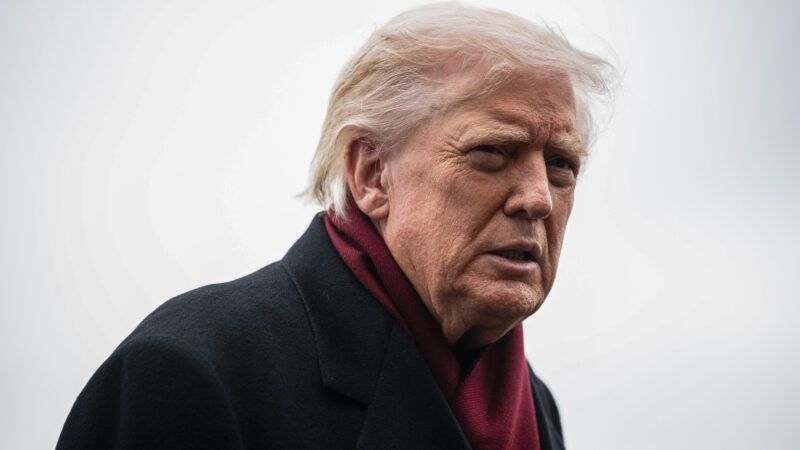Trump's Habitual Charges of 'Treason' Reflect His Authoritarian Impulses
The president’s reaction to a supposedly "seditious" video illustrates his tendency to portray criticism of him as a crime.

President Donald Trump says six members of Congress are "traitors to our Country" who "should be ARRESTED AND PUT ON TRIAL" because they produced a video reminding members of the armed forces that they "can refuse illegal orders." Trump's over-the-top reaction epitomizes his longstanding tendency to portray criticism of him as a crime against the state, which reflects his disregard for freedom of speech as well as his narcissism.
In the video, which was posted online last week, two senators and four representatives, all Democrats with intelligence or military backgrounds, allude to Trump's controversial uses of U.S. forces, including his domestic military deployments and his summary executions of suspected drug smugglers. "Americans trust their military," they say, "but that trust is at risk."
The lawmakers note that "no one has to carry out orders that violate the law or our Constitution." Although "we know this is hard," they say, "your vigilance is critical," and "we have your back."
That stance is legally uncontroversial. According to the Judge Advocate General's Operational Law Handbook, "soldiers have a duty to disobey" orders that are "manifestly illegal." Examples include intentional targeting of civilians, torture of prisoners, looting of property, and suppression of constitutionally protected protests.
Trump nevertheless claims reiterating this well-established principle amounts to "SEDITIOUS BEHAVIOR FROM TRAITORS," which he says is "punishable by DEATH!" Yet the video plainly does not qualify as sedition or treason.
Under federal law, a seditious conspiracy is a plot involving the use of force against the authority of the U.S. government. An American is guilty of treason when he "levies war" against the United States, "adheres to" its wartime enemies, or gives them "aid and comfort."
Trump's attempt to portray criticism as a crime runs headlong into the Supreme Court's 1969 decision in Brandenburg v. Ohio, which held that even advocacy of illegal conduct is constitutionally protected unless it is both "directed" at inciting "imminent lawless action" and "likely" to do so. Far from trying to incite "imminent lawless action," the legislators Trump wants to prosecute urged service members to "stand up for our laws" and "our Constitution," which they accurately said could require disobeying "illegal orders."
This is by no means the first time that Trump has recklessly accused people of treason. Back in 2019, he described Special Counsel Robert Mueller's investigation of alleged ties between the 2016 Trump campaign and the Russian government as an "illegal and treasonous attack on our Country."
After Trump fired FBI Director James Comey in 2017 out of anger at the Russia probe, Deputy Attorney General Rod Rosenstein suggested that Justice Department officials record their conversations with the president. That was also "illegal and treasonous," Trump said.
Even failing to applaud Trump during his State of the Union address might qualify as treason, he suggested in 2018. "Can we call that treason?" he wondered. "Why not? I mean, they certainly didn't seem to love our country very much."
That same year, when The New York Times published an anonymous essay by an administration official who was critical of the president, that was also "treason" in Trump's book. Likewise Democratic opposition to his immigration policies.
In December 2022, the House select committee that investigated the 2021 Capitol riot issued a scathing report that recommended criminal charges against Trump. A few months later, Trump said the committee's members "should be prosecuted for their lies and, quite frankly, TREASON!"
Last July, Trump deployed the same charge against former President Barack Obama, who he said was "caught absolutely cold" trying to "rig the election" in 2016 and 2020. "What they did in 2016 and 2020 is very criminal," he told reporters at the White House. "This was treason."
Trump, in short, habitually equates love of country with love of him, then leaps to the conclusion that anyone who discomfits, opposes, or criticizes him must be guilty of treason. That authoritarian impulse reinforces the concerns raised by that supposedly treasonous video.
© Copyright 2025 by Creators Syndicate Inc.


Show Comments (60)